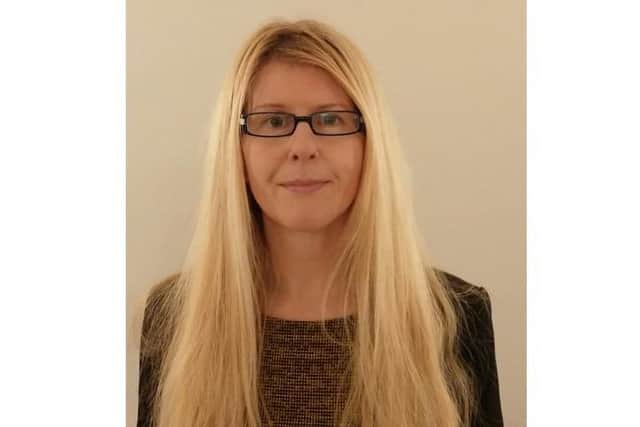Woman died after Covid vaccine induced thrombosis
and live on Freeview channel 276
The inquest at Eastbourne Town Hall on Thursday (June 9), heard Helena Ashton, a project accountant from Caple Court in St Leonards-on-Sea, died on May 25 at University College Hospital in London.
Mrs Ashton received her first AstraZeneca vaccine on May 10 at a centre in Hastings and according to her GP Dr David Fox, had no history of blood clots, never smoked, and was not on medication.
Advertisement
Hide AdAdvertisement
Hide AdMrs Ashton had been married to Brian Ashton until 2007 and was in the middle of a six-month period staying with him due to moving house.


Mr Ashton told the inquest Mrs Ashton was 'keen on exercise' and an 'extremely fit woman'.
He also said she was in 'excellent medical condition'.
Mr Ashton said Mrs Ashton was 'reluctant' to get the vaccine due to worries about side effects.
He said on May 16, six days after the vaccine was given, 'things started to go wrong'.
Advertisement
Hide AdAdvertisement
Hide AdMr Ashton said from May 16-23 she was feeling 'progressively worse' but due to her hard-working nature she postponed going to see her GP.
Mr Ashton said she had 'monstrous headaches' and blood spots on her face which she covered with make-up.
However, on May 20 Mrs Ashton believed she was feeling well enough so went ahead with plans to go to London with her partner, Mark Kempster, that weekend (May 22-23).
Mr Kempster said, “In the week leading up to the weekend in London she questioned whether she would be able to go, but by the Thursday she perked up and decided to come. By the end of the week she felt like she'd recovered enough.”
Advertisement
Hide AdAdvertisement
Hide AdWhile she was in London she saw three pharmacists, and they told her to see her GP 'at her earliest convenience', Mr Kempster said.
He said, “She was quite happy to go out around London. She didn't seem outwardly unwell in herself and it didn't stop her wanting to enjoy herself.”
On the morning of May 23 Mr Kempster said Mrs Ashton did not eat much and they got the train back that afternoon. He got off at Wadhurst and Mrs Ashton stayed on until Hastings.
That afternoon Mrs Ashton was taken to Hastings Conquest Hospital by Mr Ashton. East Sussex coroner Alan Craze said, “There was clear deterioration that day and it became a major problem quite quickly.”
Advertisement
Hide AdAdvertisement
Hide AdA CT scan was done on May 23 which was labelled as 'normal' and 'unremarkable' according to Medica, a company that deals with weekend radiology reports.
Mr Kempster said there were texts between the two of them into the evening and 'she remained positive'.
Mr Kempster said, “I was led to believe she felt this wasn't serious and thought she'd be out that evening.
“I thought she would have been discharged and out. I assumed communication stopped on Monday (May 24) because her phone had run out of charge.”
Advertisement
Hide AdAdvertisement
Hide AdHowever, the inquest heard that on the morning of May 24 Mrs Ashton's CT scan was viewed again at the request of Dr Athanasios Nakos and a blood clot in the brain was found.
Dr Nakos said, “We were all very alarmed of the condition and provided all the treatments we could as soon as possible.”
The Conquest team arranged a transfer to University College Hospital (UCH) in London for a plasma exchange.
Dr Nakos said, “Plasma transfer at UCH was her only chance of survival. We couldn't offer her anymore treatments locally.
Advertisement
Hide AdAdvertisement
Hide Ad“From the moment I was involved I was aware of the dramatic nature of this syndrome. We did everything we could when she was with us.
“This was a tragic case that has affected us all.”
Dr Luke Flower was at the UCH and said Mrs Ashton got to the hospital at 7.30pm on May 24.
He said she was treated with plasma exchange but her condition 'continued to deteriorate'.
Mr Ashton said he was told on May 24 that it was 'too dangerous' to try and relieve pressure on the brain due to a low platelet count.
Advertisement
Hide AdAdvertisement
Hide AdDr Flower said palliative care started and she died at 4pm on May 25.
On the subject of the CT scan, the inquest heard that the first reading on May 23 did not pick up on the clot. Medica admitted this was an 'observation error'.
Dr Flower concluded the hemorrhage was due to a vaccine induced thrombosis.
Mr Craze said, “She had catastrophic bleeds. There was no recognition on anybody's part on what was going to happen next.
“They didn't know everything they hopefully do know now.
“I've never had an inquest like this.”
Advertisement
Hide AdAdvertisement
Hide AdMr Craze’s official conclusion to the inquest was a narrative verdict. He said, “Her health deteriorated until on May 23 she attended A&E as an emergency and was admitted. Much intracerebral bleeding was found the next day and she died on May 25.”
The Medicines and Healthcare products Regulatory Agency (MHRA) was approached for a comment.